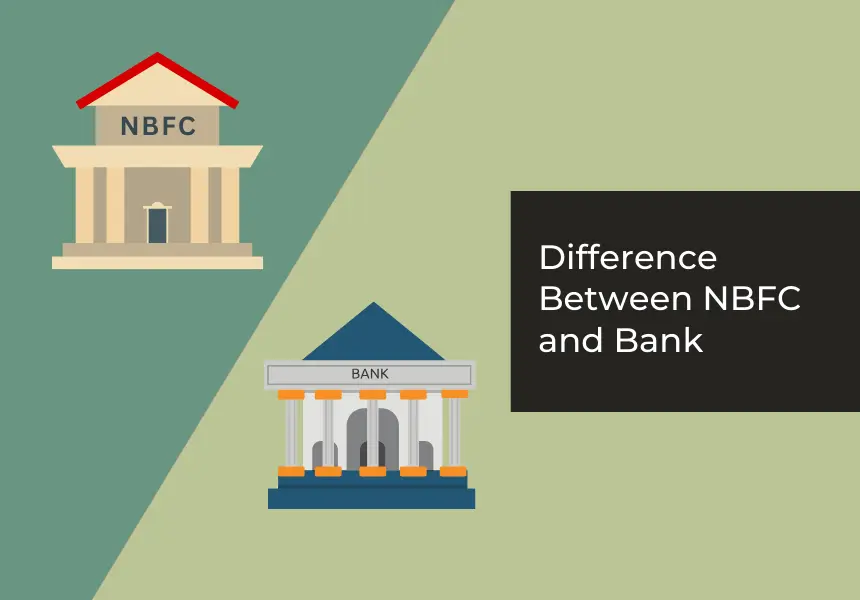
In the world of finance, banks and NBFCs are two commonly used institutions that people rely on for loans and other money-related services. Although they may seem similar at first, they operate quite differently.
Banks offer a wide range of financial services and have broader authority, while NBFCs are more specialised and primarily focus on lending.
To make things clearer, let’s take a closer look at how banks and NBFCs work and understand what sets them apart.
The key difference between a bank and an NBFC is that banks can accept public deposits and offer a full range of financial services, while NBFCs primarily focus on lending and credit-related activities.
What are NBFCs?
NBFCs, or Non-Banking Financial Companies, are financial institutions that provide loans and credit-related services but do not function like traditional banks. They are regulated by the Reserve Bank of India (RBI) but follow a more flexible framework.
NBFCs focus heavily on lending and often serve customers who may not fit into strict bank criteria. Because of their simplified processes and customer-centric approach, NBFCs have become popular among small businesses, self-employed individuals, and first-time borrowers.
Functions of NBFCs
NBFCs perform several important financial functions, including:
- Providing quick financing solutions for individuals and businesses
- Offering a business loan to MSMEs, startups, and self-employed professionals
- Vehicle, equipment, and asset-backed lending
- Credit access for customers with limited or non-traditional credit history
- Faster approvals with minimal documentation and digital processes
These functions make NBFCs highly accessible for borrowers who value speed and flexibility.
What are Banks?
Banks are traditional financial institutions licensed to accept deposits from the public and provide a wide range of financial services. They are tightly regulated by the RBI and operate under strict compliance norms.
Banks typically cater to a broad customer base, including individuals, corporations, and governments. Because of their structured systems and risk-averse approach, banks are often seen as more stable and reliable, especially for long-term savings and conventional lending needs.
Functions of Banks
Banks carry out multiple financial activities, such as:
- Accepting savings, current, and fixed deposits
- Providing loans, including housing and personal loan options
- Facilitating payments, transfers, and cheque clearing
- Offering foreign exchange and remittance services
- Enabling digital banking through apps, cards, and net banking
These functions make banks central to everyday financial transactions.
Differences Between Banks and NBFCs
| Basis | Banks | NBFCs |
| Regulation | Heavily regulated by RBI | Regulated by RBI with fewer restrictions |
| Deposit Acceptance | Can accept public deposits | Cannot accept demand deposits |
| Loan Approval Speed | Slower due to strict checks | Faster and more flexible |
| Documentation | Extensive paperwork | Minimal documentation |
| Risk Appetite | Conservative approach | Higher risk tolerance |
| Customer Focus | General public | Niche segments like MSMEs and startups |
| Interest Rates | Lower but rigid | Slightly higher but flexible |
| Accessibility | Branch-dependent | Digital-first and customer-friendly |
The biggest difference lies in flexibility and speed. Banks prioritize safety and compliance, which can slow down loan approvals. NBFCs, on the other hand, focus on customized lending solutions and faster disbursement. While banks are ideal for traditional financial needs, NBFCs shine when borrowers need quick access to funds or have unique requirements.
Advantages of Choosing NBFCs Over Banks
One of the biggest advantages of NBFCs is their speed. Loan approvals and disbursals are often much quicker compared to banks. NBFCs also offer flexible eligibility criteria, making them ideal for self-employed individuals, small business owners, and startups.
Unlike banks, NBFCs are more willing to assess borrowers based on cash flow and business potential rather than just credit scores. Another major benefit is customization. NBFCs design financial products tailored to specific customer needs rather than offering one-size-fits-all solutions.
Their digital-first approach also means less paperwork, fewer branch visits, and a smoother overall experience. For borrowers who value convenience, accessibility, and flexibility, NBFCs often provide a more practical alternative.
Which One Should You Choose?
Choosing between a bank and an NBFC depends entirely on your financial needs. If you’re looking for lower interest rates, long-term stability, and traditional services, a bank may be the right choice.
However, if speed, flexibility, and easier eligibility matter more to you, NBFCs can be a smarter option. Borrowers with urgent funding needs or non-traditional income profiles often find NBFCs more approachable. The key is understanding your priorities before making a decision.
Conclusion
Banks and NBFCs both play crucial roles in the financial ecosystem, but they serve different purposes. While banks offer stability and traditional services, NBFCs bring flexibility and faster access to credit.
There’s no universal winner, only what works best for your situation. With digital NBFC platforms like loantap, borrowers today have more choices than ever to find financing solutions that truly match their needs.
FAQs
1. Are NBFCs safe to borrow from?
Yes, NBFCs are regulated by the RBI and follow strict compliance norms.
2. Can NBFCs accept public deposits like banks?
No, NBFCs cannot accept demand deposits like savings or current accounts.
3. Do NBFCs charge higher interest than banks?
Interest rates may be slightly higher but come with greater flexibility and faster approvals.
4. Who should prefer NBFCs over banks?
Self-employed individuals, startups, and MSMEs often benefit more from NBFCs.
5. Are NBFCs suitable for first-time borrowers?
Yes, NBFCs are often more accommodating for first-time and thin-credit borrowers.








